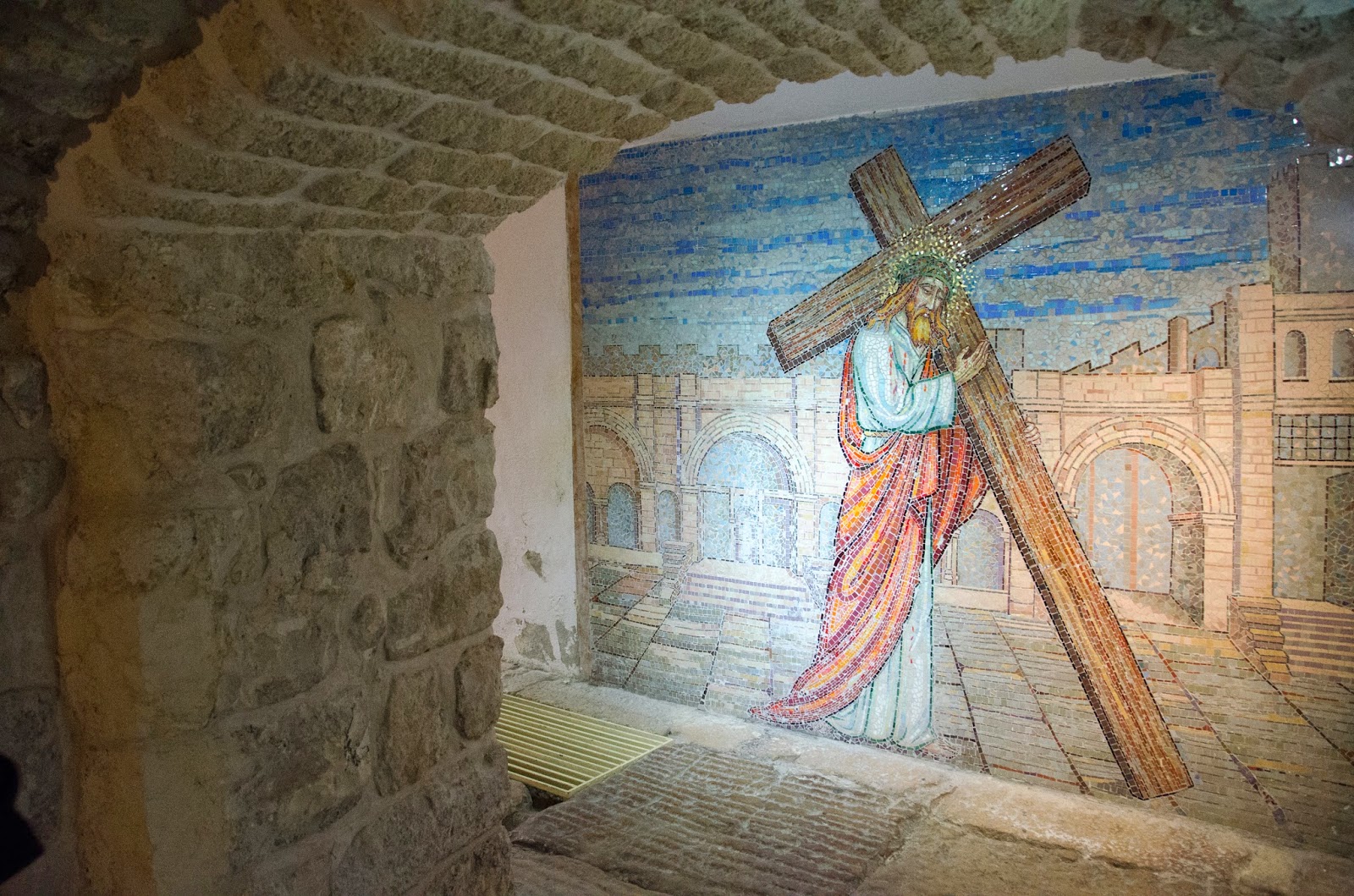Mark 15:21-32
And they compelled a passerby, Simon of Cyrene, who was coming in from the country, the father of Alexander and Rufus, to carry his cross.
And they brought him to the place called Golgotha (which means Place of a Skull).
And they offered him wine mixed with myrrh, but he did not take it.
And they crucified him and divided his garments among them, casting lots for them, to decide what each should take.
And it was the third hour when they crucified him.
And the inscription of the charge against him read, “The King of the Jews.”
And with him they crucified two robbers, one on his right and one on his left.
 |
Golgotha (the Place of the Skull),
now looks down on an Arab bus station. |
And those who passed by derided him, wagging their heads and saying, “Aha! You who would destroy the temple and rebuild it in three days, save yourself, and come down from the cross!”
So also the chief priests with the scribes mocked him to one another, saying, “He saved others; he cannot save himself. Let the Christ, the King of Israel, come down now from the cross that we may see and believe.”
Those who were crucified with him also reviled him.
Comments:
Because Jesus had been so brutalized, with pain, blood loss, and shock taking their toll he could no longer carry his own cross. Remember that Roman soldiers could compel people to carry their load for them for up to a mile (Jesus taught people to go one more). I think this situation was a little different but Simon at least got his name in the Bible for this filling this role.
Athol Dickson wrote a gripping novel (Lost Mission) featuring a mysterious and centuries-old triptych that could reveal the spiritual condition of the viewer by placing their likeness somewhere in the three-panel painting of the crucifixion. If we had to put ourselves into such a picture of the crucifixion of Jesus who would we be?
While we would like to imagine ourselves being represented by figures such as a grieving Mary, a responsible John, or a heroic servant figure like Simon of Cyrene, a more honest look inside our hearts exposes the truth and finds us…
in the soldiers' torture and tearing,
in Pilate’s giving in to pressure,
in the priests' testing,
in the “Aha!” and the “tsk-tsking” of those passing by,
in the thieves' reviling…
Yet it was for this moment that Christ had come. It was for these people, and it was for us. He went to the cross in complete submission to the will of God and experienced the physical, social, and spiritual pain, agony, and humiliation, full-strength rejecting the local anesthetic offered at the cross. One aspect of his humiliation that we don’t seem to spend much time thinking about is Jesus' emotional humiliation.
What role did we play?
In our next post, we will consider Jesus' responses on the cross.
If you are interested in reading more about the emotional humiliation of Christ, the following is an excerpt from my “Do You See Him?” curriculum that I have used in some of my Bible classes.
Jesus' humiliation also applied to His emotions. His feelings were crushed by the betrayal, the denial, the torture, and the public mocking. But there is one thing further that struck me with new force as I again studied the accounts of His crucifixion. The Bible says that He was stripped of His clothing by the soldiers in the courtyard when they mocked Him, and again at the cross. As it is written,
Matthew 27:28 "They stripped him and put a scarlet robe on him, and then twisted together a crown of thorns and set it on his head."
John 19:23-24 "When the soldiers crucified Jesus, they took his clothes, dividing them into four shares, one for each of them, with the undergarment remaining. This garment was seamless, woven in one piece from top to bottom. 'Let's not tear it,' they said to one another. 'Let's decide by lot who will get it.' This happened that the scripture might be fulfilled which said, 'They divided my garments among them and cast lots for my clothing.' So this is what the soldiers did."
I don't know if you have ever thought about it before, but it would seem from the context that they stripped Him naked. How humiliating that must have been for the God of the entire Universe, the One who was without sin, to be stripped naked for all to see. In art and in movies, of course, we see Jesus still covered by a loincloth type of garment, but in reality that was probably not the case. Perhaps we can see a hint of the public's attitude and of Jesus' pain in the words of the psalmist,
Psalm 22:16-19 "Dogs have surrounded me; a band of evil men has encircled me, they have pierced my hands and my feet. I can count all my bones; people stare and gloat over me. They divide my garments among them and cast lots for my clothing. But you, O LORD, be not far off; O my Strength, come quickly to help me."
The people were staring and gloating over Jesus. Can you think of anything more humiliating, if you have any modesty or discretion at all than to be abused terribly and then hung completely naked and helpless for all your enemies and your loved ones to see? I can't. Forgive me for being so graphic but I don't want us to miss the full impact of Jesus' complete emotional humiliation. It is written,
Psalm 35:11-12,19 "Ruthless witnesses come forward; they question me on things I know nothing about. They repay me evil for good and leave my soul forlorn . . . Let not those gloat over me who are my enemies without cause; let not those who hate me without reason maliciously wink the eye."
Psalm 69:19-21 "You know how I am scorned, disgraced and shamed; all my enemies are before you. Scorn has broken my heart and has left me helpless; I looked for sympathy, but there was none, for comforters, but I found none. They put gall in my food and gave me vinegar for my thirst."
Just as our sin, if not covered by God's grace, will one day be exposed, and laid naked for all to see, so Jesus, as he became sin for us, submitted to the humiliation of nakedness that began in the garden so long ago.
 The following points are taken from my first sermon, given to a group of young adults in 1985 at B4 Church in Beaverton, Oregon. I recently pulled these typed (what we did before computers) notes out of the filing cabinet tomb where they had been buried for many years.
The following points are taken from my first sermon, given to a group of young adults in 1985 at B4 Church in Beaverton, Oregon. I recently pulled these typed (what we did before computers) notes out of the filing cabinet tomb where they had been buried for many years.  Remember in Mark 10:46-52 when Jesus healed blind Bartimaeus? We need to stop going along with the crowd and minister compassionately like Jesus did, rather than telling hurting people to be quiet. We need to make sure we are not avoiding the challenges to our faith but rather embracing them in the love of Christ.
Remember in Mark 10:46-52 when Jesus healed blind Bartimaeus? We need to stop going along with the crowd and minister compassionately like Jesus did, rather than telling hurting people to be quiet. We need to make sure we are not avoiding the challenges to our faith but rather embracing them in the love of Christ.





















